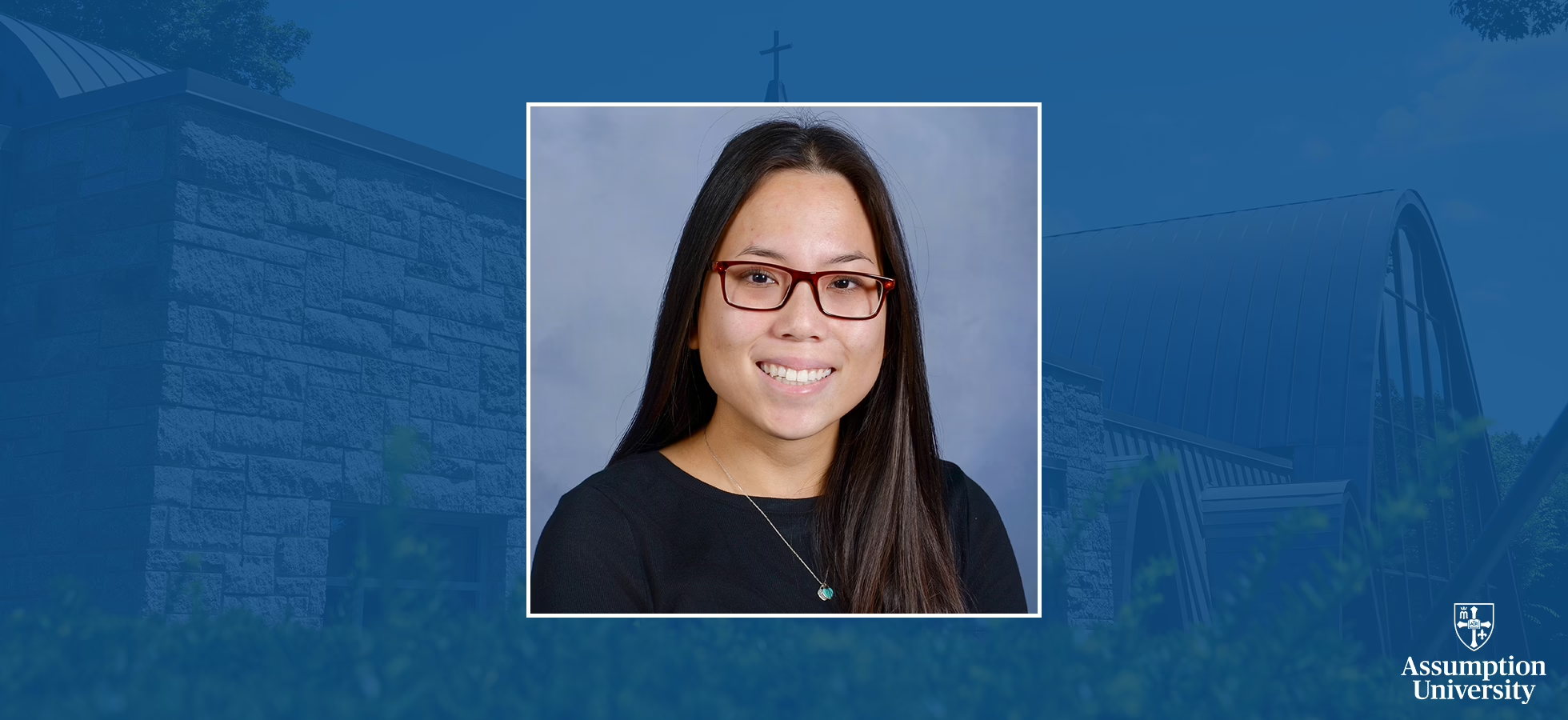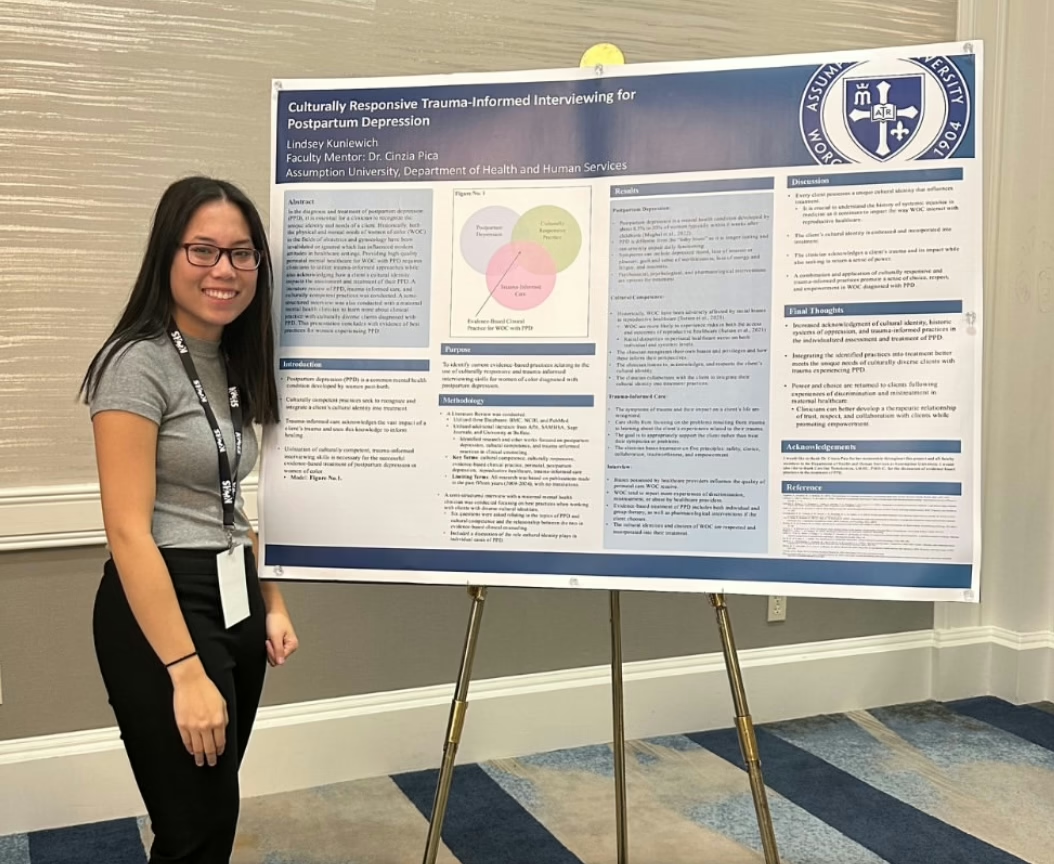Lindsey Kuniewich ’25 Receives 2024 Outstanding Student in Human Services Award

Lindsey Kuniewich ’25, was recently awarded the 2024 National Organization for Human Services (NOHS) Outstanding Student in Human Services Award. Kuniewich is a human services major with a concentration in communication sciences and disorders, which prepares students to work with patients in the field of speech-language pathology or audiology. She also has a minor in women’s studies. This is the second year in a row that an Assumption student has won the NOHS award, with alumna Katy Cannistraro ’24 being named Outstanding Student at the conference last year.
“It means a lot to me, because it means that people see potential in what I’m doing and the future I have in human services,” she said. “It’s that feeling of validation and knowing that I have all these people who actually see something that I’m doing as important.”
Kuniewich was presented with the award at the annual NOHS conference, held from November 8 to 11 in New Orleans, Louisiana. Along with receiving her award, Kuniewich also had the opportunity to present her research, done with Professor of Human Services Cinzia Pica.

Kuniewich with her research.
Her research, titled “Culturally Responsive Trauma-Informed Interviewing for Postpartum Depression,” examines the intersection of postpartum depression, culturally responsive techniques, and trauma-informed interviewing in the context of women of color suffering from postpartum depression.
“I understand that there’s this knowledge that clinicians in a mental health setting understand these three frameworks separately, but putting them together is a little bit different, especially when you’re working with a population who’s often been marginalized,” she said.
Pica connected Kuniewich with a maternal mental health clinician who focuses specifically on postpartum depression for an interview during her research, which helped her to understand from a first-hand perspective the importance of her work.
“The interview I did tied everything I had together. The clinician told me about people who were not informed very well by their providers, who had to make split-second decisions on whether they wanted a C-section,” Kuniewich said. “She said they didn’t feel respected, and the clinicians didn’t even really want their opinion – it was like a power imbalance, like the healthcare provider knows better.”
“My research is about putting all of these things together to understand how to work with a group that has been historically marginalized and respecting their cultural identity in the context of their trauma,” she said.
Kuniewich was able to present her work at both the NOHS Conference and at the 2024 Undergraduate Research Symposium at Assumption in April.
“It was really great getting to do the Undergraduate Symposium because it gave me presentation experience. I got a pretty positive reception there, and I think it gave me a good idea of what it would look like in a bigger context,” she said. “When I showed my work at the NOHS Conference, it was really validating to hear other people say, ‘this is a really important topic,’ and that this is something that needs to be looked at. I got a lot of joy out of knowing that other people saw value and potential in what I was doing.”
In addition to the research she presented at the NOHS Conference, which she is currently considering submitting to a journal, Kuniewich is working on multiple other projects related to the field of human services. Her current research is focused on how human services professionals can work with immigrant women who have experienced intimate partner violence.
Kuniewich has worked on all of her research with professors in the Human Services department, namely Pica.
“When I think about my experience as a human services student, I feel really lucky,” she said. “The professors that are in the department are such a good group, and I love how they have this holistic understanding of students. I have professors who are available to support me, they want to support me. I feel really lucky that I have the professors that I do, and that they’ve pushed me to explore these opportunities. My professors and their research and work have inspired my desire to contribute to the field.”
After her graduation in the spring of 2025, Kuniewich will be pursuing postgraduate studies to become a speech pathologist. The research and experience she has gained as a human services student, she says, will help her to better serve diverse populations.
“I think that knowing culturally responsive and trauma informed approaches can tie into any population you’re working with – it doesn’t have to just be those experiencing, for example, postpartum depression,” she said. “I think that even the basis of my research can be carried into other helping professions – it’s not just limited to one group of people. It’s something that clinicians should have an idea of in general. I hope my research promotes more equitable care in health and human services.”
